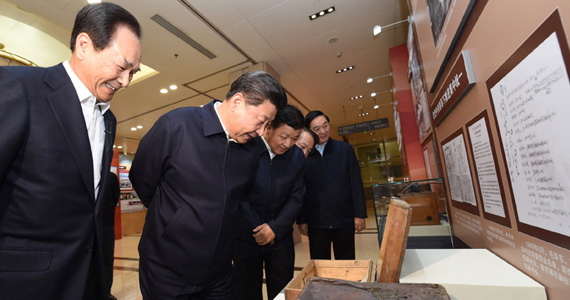
When Liu Fei (刘非), the Communist Party secretary of Hangzhou, visited the city’s main newspaper group last week ahead of its 70th anniversary, he had no words of wisdom, only perfectly echoed directives from the very top of the political hierarchy. And though this was not news in the general sense of the word, Liu’s speech was splashed across local news media over the weekend, illustrating how CCP control over the media is hammered down through layers of bureaucracy through constant, insistent repetition.
Liu’s October 31 visit to the Hangzhou Daily Press Group (杭州日报报业集团), a Party-run media conglomerate that operates the flagship Hangzhou Daily (杭州日报) and the popular metro daily City Express (都市快报), demonstrated the ritualistic nature of Party control. Speaking to editors and reporters, Liu emphasized that “media run by the Party and government are the propaganda positions of the Party and government, and must be surnamed Party” — language that Xi Jinping placed at the center of press controls with his February 2016 speech on media policy.

Even the imagery emerging from the Liu Fei’s visit to the group bore unmistakable echoes of Xi’s visit to the People’s Daily newspaper more than a decade ago — the top leader staring at new media products and historical displays while accompanied by a troupe of fellow (male) officials.
Liu instructed journalists to “firmly uphold the principle of the Party managing media” (坚持党管媒体) and “establish a Marxist view of journalism” (牢固树立马克思主义新闻观), all boilerplate language reinforcing the subordination of news organizations to the CCP.
The only point of semi-freshness in Liu’s anniversary activities came as he toured the newspaper group’s “AI Media Innovation Center” (新质AI媒创新应用中心), where he emphasized another point of overlap with central policy: The need for constant innovation. Liu stressed that “media convergence” (媒体融合), or the integration of the latest technologies with the media, is “the direction of the times and the general trend” — once again, verbatim Xi Jinping. Liu called on the press group to harness artificial intelligence to “empower and increase efficiency” (赋能增效) in news production.
Whatever efficiencies AI might bring to the city’s newsrooms, the core message in Hangzhou was the same as everywhere else across the country. The media must embrace technological innovation and modernize their operations, but the fundamental mission of amplifying the Party’s voice — and staying within its carefully policed boundaries — remains immutable.




















